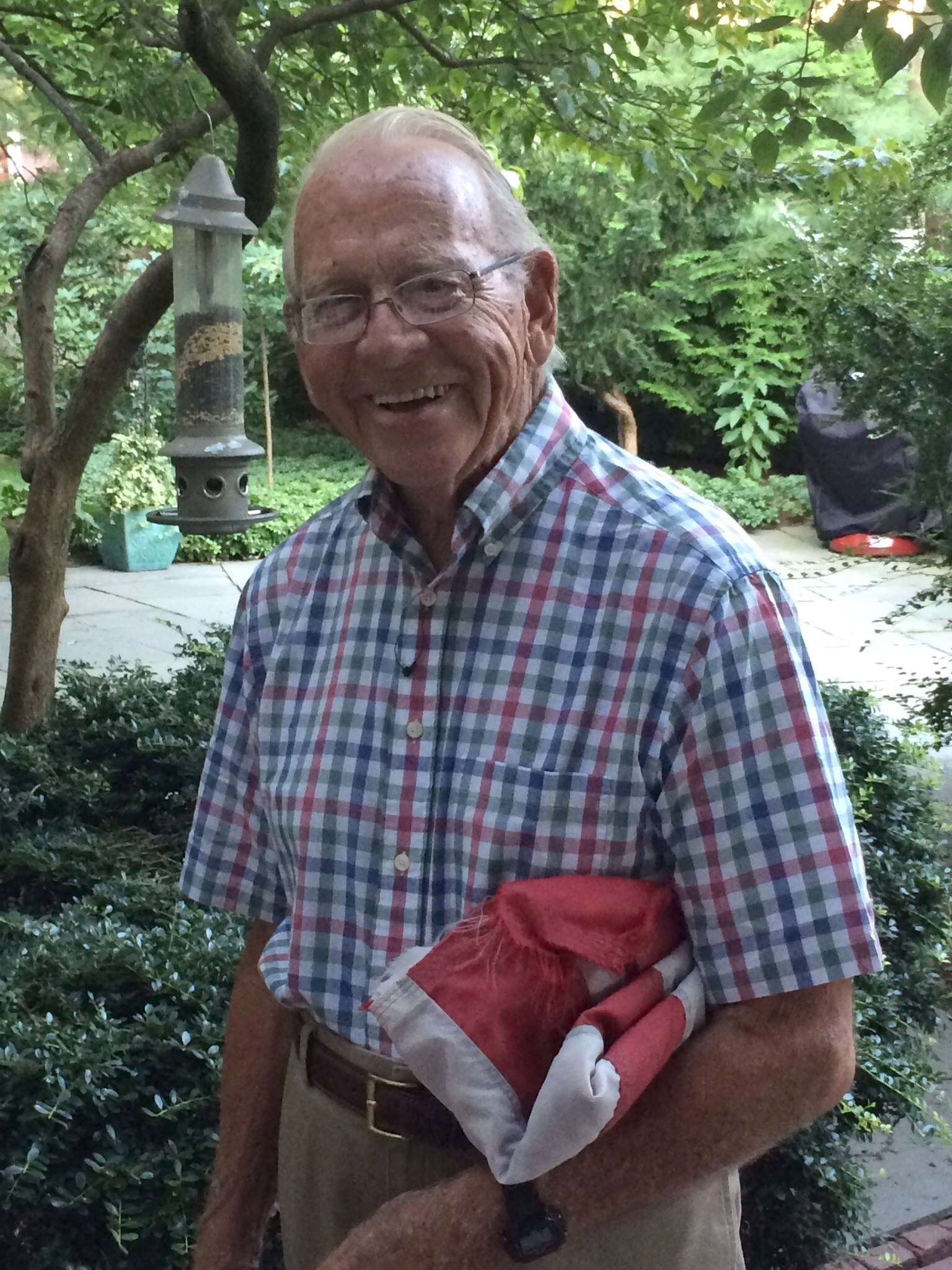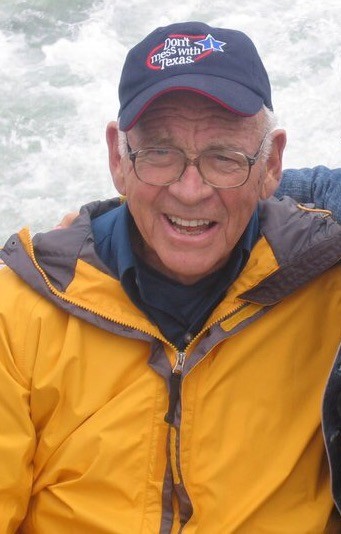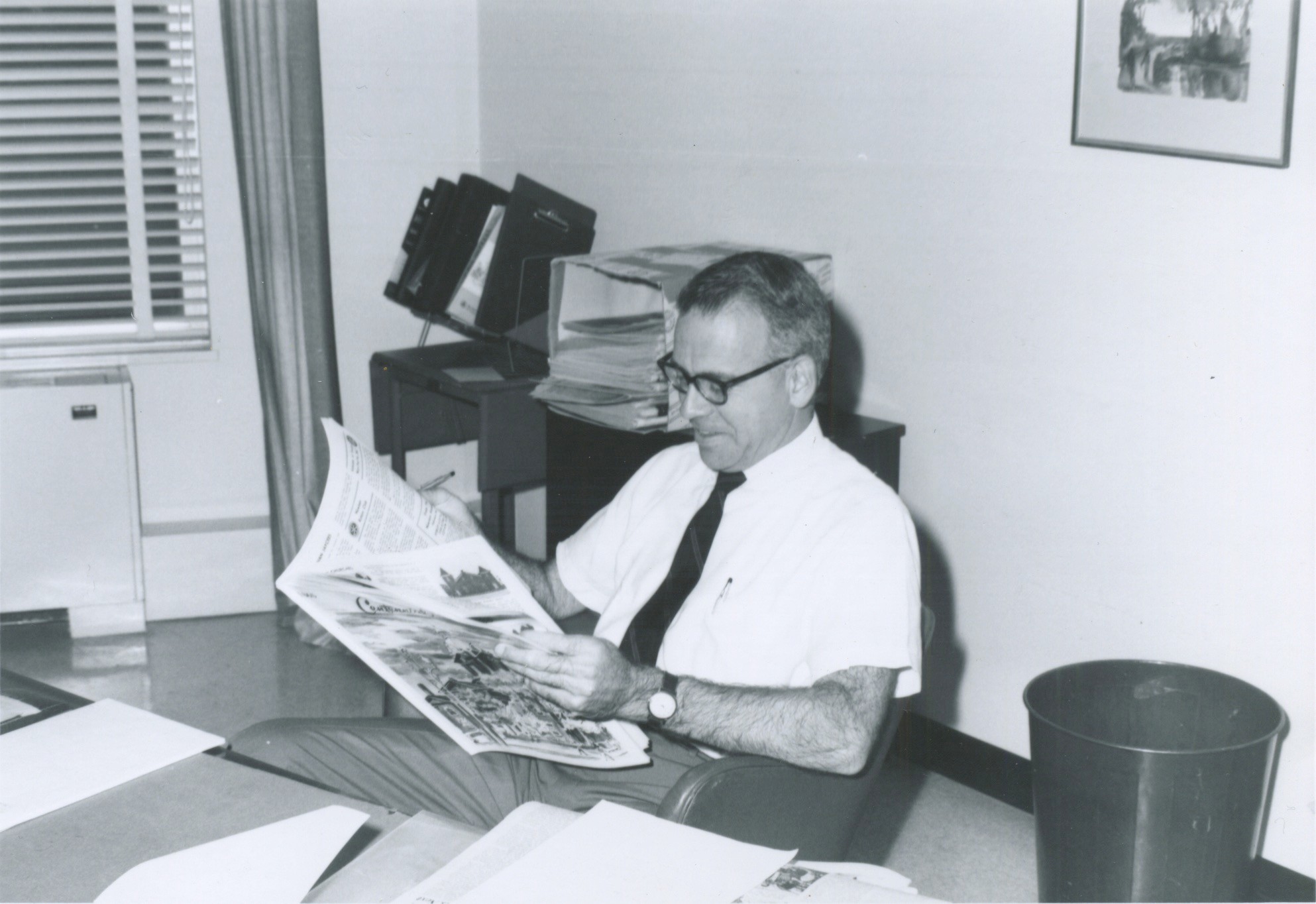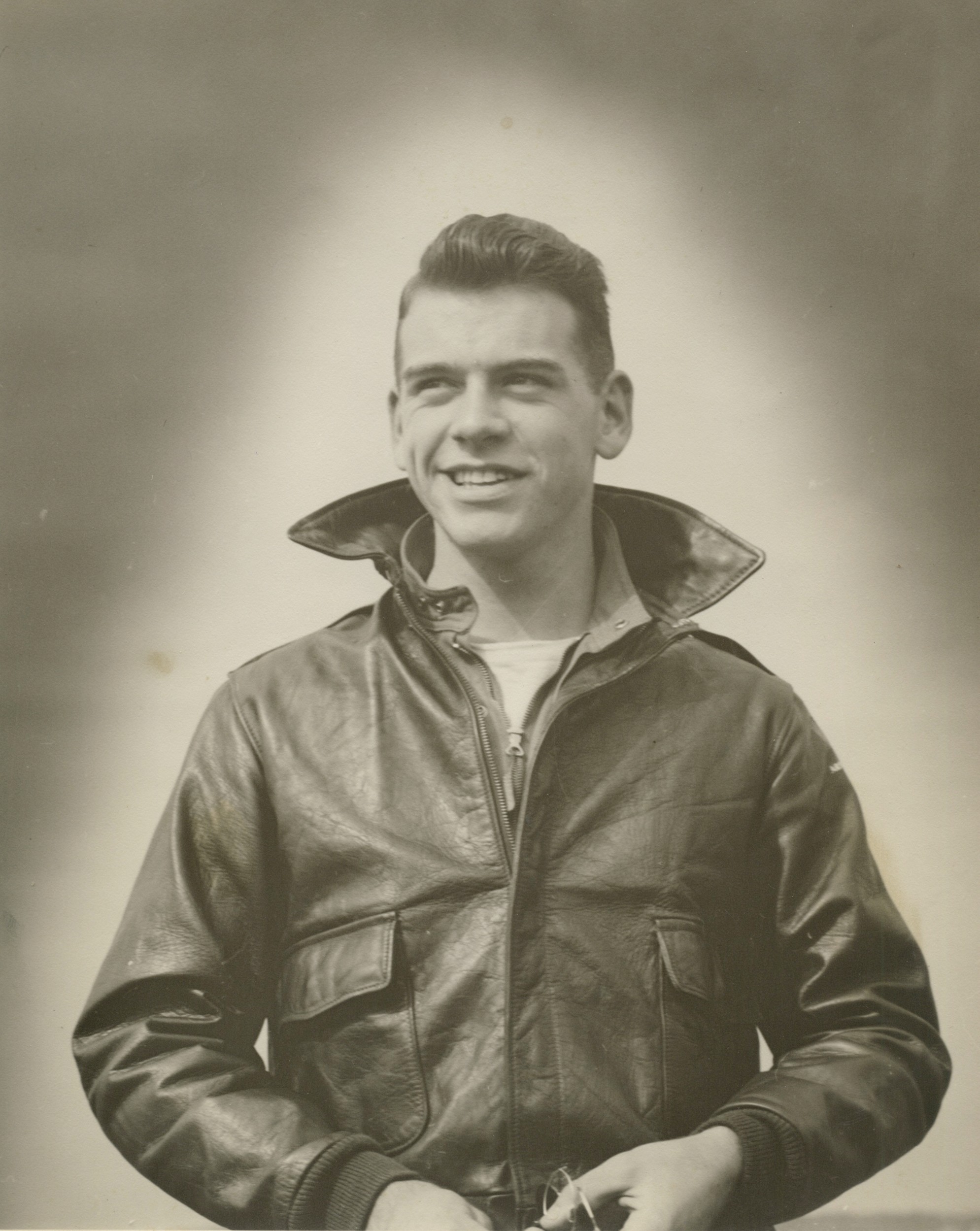What a life! Remembering newspaperman Ros Bosworth, Jr.
Five months after celebrating his 90th birthday, retired East Bay Newspapers Publisher Roswell S. “Ros” Bosworth Jr. died last Tuesday, Feb. 7. He passed away with his wife Marcia by his side during a visit to Cooper Island in the British Virgin Islands, a place of happy memories for both where he and Marcia had arrived the week before for a long-anticipated family gathering.
Nationally admired newspaperman, Army Air Force aviator, sailor, leader in his community, Bristol Fourth of July Parade chief marshal, honored by leaders of his industry and the president of Portugal … “What a life!” said friend Geoffrey Davis.
Destined for publishing
Ros was raised in the newspaper business. At age 12 he watched his father, the late Roswell S. Bosworth Sr., cover the Hurricane of 1938 for his Bristol Phoenix, he was named ‘Class Journalist’ in his Colt Memorial High School Class of 1944 yearbook, and he edited his college paper at the University of Rhode Island.
He took on an ever-growing role in the family business — reporting, helping out on the press (which once lopped off part of one of his fingers) and delivering papers.
After Ros Bosworth, Sr. retired, his son grew the company with the addition of the Barrington Times, Warren Times-Gazette, Sakonnet Times and East Bay Classifieds.
Ros was a leader in the community newspaper business, both in these towns and beyond. He was a founder of state and national press associations and resides in the Hall of Fame of several of those groups. (His obituary provides a sampling of honors.)
“Over a 50-year period, Ros Bosworth took on a small, one-newspaper publishing company and with hard work, grit and determination built what became the East Bay Newspapers group of local newspapers in Rhode Island,” said Matt Hayes, Ros’ stepson and now publisher of the newspaper company. “Ros was the quintessential newspaper editor and publisher — while trained as a journalist, he was fascinated by all aspects of the business. He combined a never satisfied reporter's curiosity with a tremendous business sense and was extremely successful. He earned the respect and accolades from his peers around the country for excellence in community newspapering. We will miss him dearly."
“For me, Ros was the dean of Rhode Island community newspapers,” said John Howell, publisher of the Warwick Beacon.
“Ros believed in the value of community newspapers. They were family that was there to listen, record, comment and say their piece. It was a role the ‘out of town’ folk could never fulfill and one he took seriously. On a personal level, his enthusiasm and optimism were always energizing. I would leave meetings feeling no problem was too daunting and ready to take on the next challenge. I also envied how his father and later members of his family worked at the paper. He was committed to the community.”
As influential as he became in the industry, he always made time to listen to his readers.
Ros had many visitors to his first-floor Phoenix office. Acquaintances who went way back asked for him by an old nickname — “Brother” — (the implication, ‘He’ll be happy to see me without appointment on deadline day). The fact was, Ros made time for everyone.
‘It would be great if the paper got behind our fundraiser,’ the visitor might say.
The answer was always, ‘certainly.’
‘The Phoenix should look into those scoundrels in the zoning department — and you didn’t hear it from me.’
‘We’ll take a look,’ Ros would reply — and he meant it.
‘You should fire that reporter for what she wrote about me and the zoning office.’
‘Sorry — she’s staying — the story was accurate.’
And, ‘Remember all the good times we used to have … You’ve got to get my name out of the police report.’
‘Those were great times — but sorry, can’t do it.’
Having grown up in a time of rough and tumble Bristol politics, Mr. Bosworth possessed a keen sense for government funny business and was not shy about commenting.
In one editorial that filled the entire front page, he took a town administrator to task for “jumping the gun.” That administrator, he wrote, “was sworn in without announcement the previous midnight, hustling the town clerk out of bed to officiate. The new administrator and his junta should be aware that they are in a very delicate position indeed.”
That administrator fired back in a letter the next week — it, too, was given the front page — calling for the paper to cease printing such nonsense.
Later, when that same administrator demanded that a reporter be transferred far away from Bristol, Ros editorialized that the administrator “should realize that a newspaper which transferred a reporter at the request of a local political figure would contradict every tradition of the press and would be the laughing stock of the profession.”
He was a firm believer that the community newspaper should reflect all of its constituencies. For many years the Phoenix printed the Portuguese Page, edited by the late Dr. Manuel da Silva and the late Luis Martins, and the annual Italian and Portuguese feasts were front page news. His efforts earned him appointment by the president of Portugal to the distinguished Order of Prince Henry the Navigator.
Above all, he taught his staff about accuracy and fair play.
Early in his career, Geoff Davis worked for Ros.
“If you look up the definition of newspaperman in the dictionary, there ought to be a picture there of Ros Bosworth. He was a great reporter, a terrific editor and a remarkable small businessman. He grew the Phoenix from a one-town paper, which would probably never have survived by itself, into a group of papers that has thrived for decades, even as the newspaper business generally has been slowly dying,” Mr. Davis said.
“And he did all of this without ever compromising the news side to keep the business alive. That is a truly remarkable thing, because running a local paper is so much harder than what people today think of as reporting. Those who give us so much of our news today over TV or the web never need to answer to the school superintendent’s wife at the local grocery store after your paper just wrote some damning article about her husband. He taught all of us who were fortunate to work with him over the years to remember that everyone we covered had a family and that there would always be people reading the paper who knew more about what we were writing about than we did, so we had better get it right.”
When his time finally came time to retire, the news instinct remained intact. If from his Prudence Island porch he spotted a noteworthy (or suspicious) vessel, he’d alert a reporter — one such ship that struck him as strange was later raided by customs officials dockside in Portsmouth on suspicion of smuggling.
And he stayed every bit as involved in his community as ever.
Community leader
It is not exaggeration to say that the map of Bristol was transformed by Mr. Bosworth’s work over the decades.
He and his father were key early supporters of the establishment of Colt State Park and, later, Independence Park, an abandoned and run-down rail yard.
During his chairmanship, the harbor commission oversaw construction of the town dock at Rockwell Park, the State Street boat launching ramp, purchase of the State Street Dock and acquisition of the land that would become Bristol Town Beach and sports complex.
He was a leader in the preservation and transformation of Bristol’s Linden Place.
“When a group of townspeople became interested in the purchase of Linden Place so as to open it to the public, Ros was behind the drive and was elected the second president,” said Joan Roth, a longtime friend and classmate from Bristol.
“In those early days it meant that he served as acting 'executive-director' as well, since we couldn't hire a professional until we became financially established. So it wasn't unusual to see the 'president/director' climb up out of the dirt cellar beneath what is now our gift shop, sleeves rolled up and dirty … in fact his sleeves were 'rolled up' a good deal of the time — he was certainly a hands-on leader,” Ms. Roth said.
In the 1960s, he and his father were instrumental in bringing the campus of then-Roger Williams College to Bristol from its former home in the basement of the Providence YMCA.
DeWolf Fulton of Bristol knows the story well. ”The president at the time, Ralph Gauvey, came down to Bristol and sat with Ros and Ros Sr., to see if they knew of any parcels of land that might be appropriate in the East Bay. Ros right away thought of Ferrycliffe Farm, which was owned by my parents … Dairy farming was on the wane, and my parents weren't crazy about selling the farm to become house lots. So they struck up a conversation, and the rest, as they say, is history."
Mr. Fulton's parents, Dr. Marshall Fulton and Mary Howe DeWolf Fulton, owned more than 120 acres of farmland at the southern end of the Bristol peninsula. Mr. Bosworth had actually worked as a farmhand at Ferrycliffe Farm in the 1940s, where he learned about both Jersey cattle and the beauty of that waterfront property.
When the Roger Williams campus was re-dedicated as the Marshall Fulton Campus this past August, Ros was a speaker.
"He was a great inspiration and mentor to so many of us," Mr. Fulton said. "He was a great supporter of fellowship, family and preserving our institutions."
Ros had the idea to erect a memorial recognizing Bristol's role in the War for Independence, and he recruited a team from the Fourth of July Chief Marshals Association to assist. Good friend Herbie Moitoso and Ros spent two years on the effort, including multiple trips to the plaque designer in Somerville, Mass., and recruitment of key contributors like Seraphin Daponte. The enormous granite monument anchors the north end of Independence Park and tells the story of Bristol in the Revolutionary War.
"I learned so much from Ros," Mr. Moitoso said. The two men spent more than a decade together in the Bristol Rotary Club. "I looked up to him as a leader. He was always thinking of ideas, and usually those ideas turned into actions."
However, Ros was happy to stay in the background, never seeking the spotlight.
Mr. Moitoso said Ros was a lifelong advocate for and supporter of the Portuguese community in Bristol — "his coverage of the ’57 volcano in Faial was incredible."
"I'm going to miss him. I lost a good friend, and Bristol lost a legend," Mr. Moitoso said.
Man of many interests
A volunteer firefighter in his younger years, Ros was a staunch advocate for Bristol’s volunteer fire force. His office was decorated with fire helmets and apparatus and he even owned a red antique REO Speedwagon engine which made several Fourth of July Parade appearances — they were brief given its tendency to overheat.
He was an pilot, a sailor, gardener, historian, writer and lifelong learner.
Years ago, he, Marcia and family cruised the coast aboard their ketch, Fleur. Later he loved time spent in their cottage out in Prudence’s Bristol Colony. He raised blueberries, trapped lobsters, spoiled his West Highland Terriers, did home projects with friend Adelino Almeida, and wrote chapters about his life’s adventures.
Most important of all was family.
In their back garden last September with Marcia at his side for his 90th, he recognized the children, spouses and grandchildren who had traveled from far and wide. Having them here with me at this moment means more than I can describe, he said.
“Our dear friend and colleague Ros is irreplaceable,” said friend Garry Holmstrom. “He will never leave us or this town of Bristol. He is of the strong fabric that binds and builds a community. When we believe that ‘Faith without works is dead’ (James 2:17), then we can begin to understand that it was Ros’ tireless calling that produced innumerable good works for his loving wife Marcia, his adoring family, this community, and his Bristol, country and God. Perhaps this is what put the backbone of good works into his strong, living faith. I think this is why we can never be apart from Ros.”













